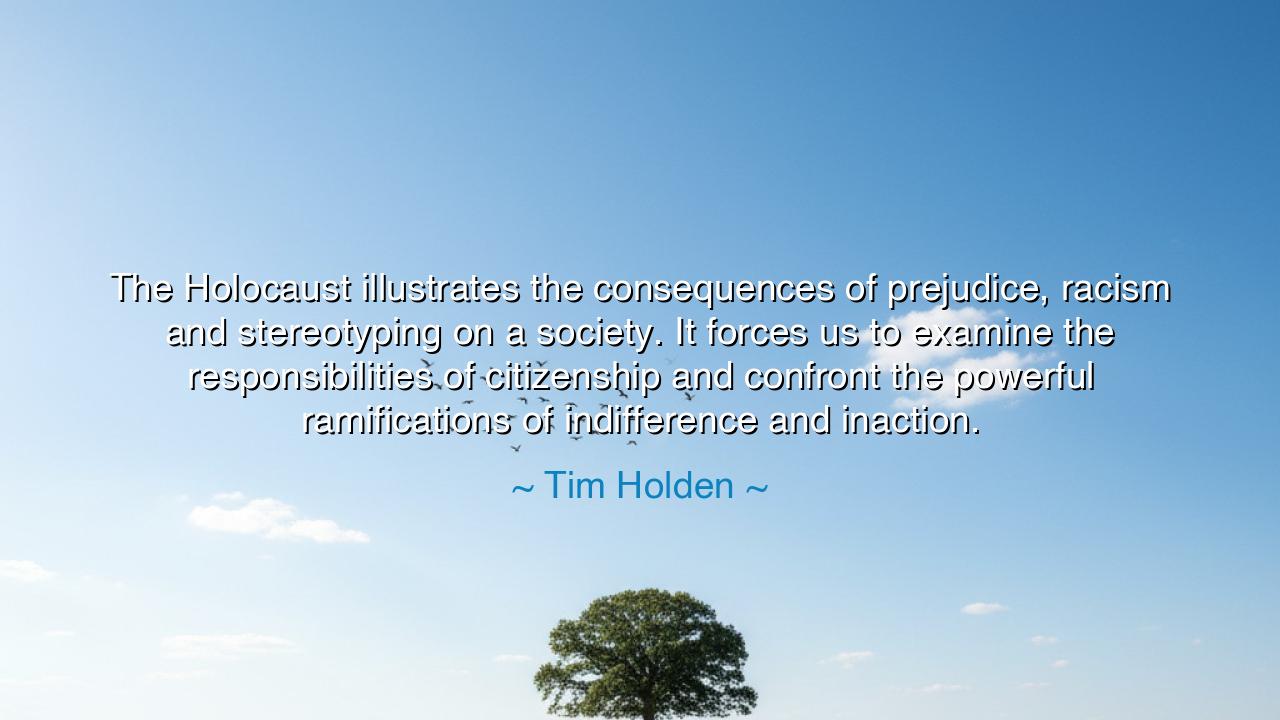
The Holocaust illustrates the consequences of prejudice, racism
The Holocaust illustrates the consequences of prejudice, racism and stereotyping on a society. It forces us to examine the responsibilities of citizenship and confront the powerful ramifications of indifference and inaction.






Hear the solemn words of Tim Holden, spoken with the weight of remembrance: “The Holocaust illustrates the consequences of prejudice, racism and stereotyping on a society. It forces us to examine the responsibilities of citizenship and confront the powerful ramifications of indifference and inaction.” These words are not light, nor are they meant to comfort. They are carved from the memory of humanity’s deepest wound, a wound that reveals how quickly civilization collapses when hatred is allowed to fester, and how silence itself becomes a weapon when injustice rises unchecked.
The Holocaust stands as one of history’s darkest mirrors. It was not wrought by monsters alone, but by ordinary men and women who surrendered to prejudice, who allowed stereotyping to replace humanity, who turned away in indifference while neighbors were marked for death. Here lies the terror: that an entire society, one of culture, science, and art, could be twisted into an engine of destruction by the poison of racism. Holden’s words remind us that this was not an accident, but the harvest of seeds long planted—seeds of suspicion, division, and hate.
Consider the story of Anne Frank. A young girl with dreams of becoming a writer, she was hidden for years in a secret annex, scribbling her hopes in the pages of a diary. Her only crime was her birth as a Jew, her existence judged unworthy by the laws of hate. Her family was betrayed, her young life extinguished in a concentration camp. Yet through her words, the world hears the voice of innocence crushed by inaction, and the cry of a child who should have been protected by her society, but was instead abandoned. Her story stands as eternal proof of Holden’s warning: prejudice unchecked leads not to discomfort, but to annihilation.
The ancients taught that the strength of a city lay not in its walls, but in the virtue of its citizenship. Yet when citizens grow passive, when they look away from evil, when they say, “It is not my concern,” then the very foundations of society crumble. In Germany and beyond, countless men and women who did not kill nevertheless allowed the killing to continue, their silence granting power to the oppressors. This is the power of indifference—it multiplies evil by doing nothing to oppose it. As Elie Wiesel, a survivor, once declared: “The opposite of love is not hate, it is indifference.”
But Holden’s words do not only recount tragedy; they summon us to vigilance. They teach us that the responsibilities of citizenship are not passive but active: to speak when others are silenced, to defend when others are attacked, to resist when injustice demands submission. To be a citizen is not merely to live in a land, but to bear duty to its people, to ensure that prejudice does not take root, that stereotyping is challenged, and that racism finds no shelter in the heart of the community.
The lesson is thus: the Holocaust must never be seen as distant history, but as a perpetual warning. Hatred begins with words, with whispers, with the casual dismissal of neighbors. Left unchallenged, it grows into policies, into violence, into genocide. If we allow inaction to reign, the cycle may return. But if we answer hatred with courage, if we guard against indifference, if we accept the true weight of citizenship, then we honor the memory of the victims by ensuring that their fate is never repeated.
What, then, must we do? In our daily lives, resist every form of prejudice. When a cruel joke is told, do not laugh. When a neighbor is scorned for race, religion, or creed, stand beside them. Teach children not only knowledge, but compassion. Support leaders and policies that protect the vulnerable, rather than scapegoat them. And above all, remember that silence is not neutrality—it is surrender. To be just, to be moral, to be human is to act.
Thus remember: the Holocaust is not only a story of death but a lesson for the living. It warns us of the abyss into which society falls when racism is tolerated, when indifference reigns, when citizens abandon their duties. Tim Holden’s words shine like a torch in the darkness: let us carry it forward, guarding humanity against the shadows of its own past, and building a future where prejudice has no throne, and where justice walks hand in hand with compassion.






AAdministratorAdministrator
Welcome, honored guests. Please leave a comment, we will respond soon